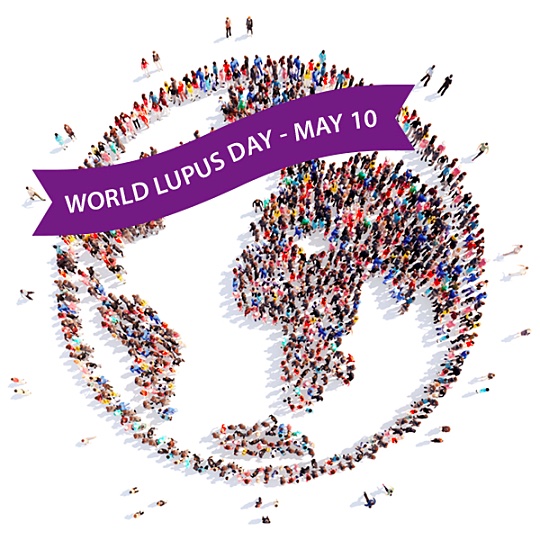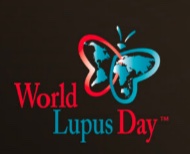World Lupus Day Marked by Global Survey Showing 36% Are Unaware Lupus Is a Disease

 Today, May 10, is World Lupus Day, and to mark the day, the newly launched World Lupus Federation (WLF) undertook its first global initiative — releasing the results of one of the largest global surveys ever conducted into public awareness of and attitudes toward lupus.
Today, May 10, is World Lupus Day, and to mark the day, the newly launched World Lupus Federation (WLF) undertook its first global initiative — releasing the results of one of the largest global surveys ever conducted into public awareness of and attitudes toward lupus.
The online, six-question survey, conducted March 24 to April 8, involved 16,911 adults in 16 nations: Argentina, Australia, Brazil, Canada, Denmark, Finland, France, Germany, Indonesia, Italy, Japan, Spain, South Korea, Switzerland, the U.K. and the U.S., with a minimum of 1,000 respondents from each country. Results reveal that many misconceptions exist about the autoimmune disease, said the WLF, a coalition of nearly 200 global lupus patient groups.
 The survey was conducted by GSK (GlaxoSmithKline), which shared the data as part of the company’s ongoing efforts to assist the federation. The WLF, through coordinated efforts among its global affiliates, is working to create greater awareness and understanding of lupus, provide education and services to people with the disease, and to advocate on their behalf.
The survey was conducted by GSK (GlaxoSmithKline), which shared the data as part of the company’s ongoing efforts to assist the federation. The WLF, through coordinated efforts among its global affiliates, is working to create greater awareness and understanding of lupus, provide education and services to people with the disease, and to advocate on their behalf.
Key findings of the survey include:
• More than a third of respondents (36%) did not know lupus is a disease.
• More than half of respondents (51%) either did not know that lupus can result in serious health complications, such as kidney failure, anemia or a heart attack, or could identify a complication.
• More than a third of respondents (36%) indicated they did not know any factors that might contribute to developing the disease.
 The Washington, D.C.-based WLF affiliate, the Lupus Foundation of America (LFA), serves as the Secretariat for the World Lupus Federation. It noted that the survey revealed several social stigmas regarding people with lupus, due to a misconception that lupus is contagious. For example, according to the LFA:
The Washington, D.C.-based WLF affiliate, the Lupus Foundation of America (LFA), serves as the Secretariat for the World Lupus Federation. It noted that the survey revealed several social stigmas regarding people with lupus, due to a misconception that lupus is contagious. For example, according to the LFA:
• 47% feel less than comfortable shaking hands with someone with lupus, compared with 36% who feel very comfortable.
• 44% feel less than comfortable sitting next to someone on a bus who has lupus.
• 1 in 3 people (31%) are uncomfortable sharing food with someone who has lupus, underscoring that people strongly believe the disease is infectious.
• 23% of respondents are uncomfortable hugging someone with lupus, with 11% of those respondents feeling quite uncomfortable.
 “When people hear that lupus is an autoimmune disease, they immediately equate it to other diseases of the immune system, like HIV and AIDS,” Dr. Susan Manzi, director of the Lupus Center of Excellence at the Allegheny Health Network in Pittsburgh, Pennsylvania, and medical director of the Lupus Foundation of America, said in a LFA release. “In the absence of knowledge, people mistakenly believe that lupus is a contagious disease.”
“When people hear that lupus is an autoimmune disease, they immediately equate it to other diseases of the immune system, like HIV and AIDS,” Dr. Susan Manzi, director of the Lupus Center of Excellence at the Allegheny Health Network in Pittsburgh, Pennsylvania, and medical director of the Lupus Foundation of America, said in a LFA release. “In the absence of knowledge, people mistakenly believe that lupus is a contagious disease.”
The WLF was created to raise lupus’ profile on the international stage, and to deliver a global rallying cry to focus more attention and resources on ways to effectively combat lupus, which is estimated to affect some 1.5 million people in the U.S. and more than five million worldwide.
Its mission is to unite lupus patient groups worldwide to improve the quality of life for everyone affected by lupus. Guided by an international steering committee representing organizations on five continents, the WLF works to ensure a coordinated effort among global lupus organizations and to enhance their ability to serve patients through programs of education, awareness, and advocacy.
World Lupus Foundation objectives include:
• Inspiring people around the world to join efforts that will generate attention and resources to help fight lupus and better treat the disease.
• Creating a strong unified voice among lupus organizations to raise awareness and foster public recognition of lupus.
• Elevating lupus on the world’s healthcare agenda in order to influence governments, health ministers and key institutions to develop constructive policies and programs that increase support for patients, their health providers, families and caregivers.
• Establishing partnerships with appropriate global and regional health organizations to further WLF goals.
• Connecting people with lupus around the world and empowering them to advocate for increased funding for lupus research and support services.
• Provide training, tools, and resources to build the capacity of lupus organizations to serve their constituents.
• Exchanging programmatic information, materials, and guidelines to assist in capacity-building efforts.
 “Public awareness of lupus around the world is low and a range of misconceptions persist about the autoimmune disease,” said Sandra C. Raymond, Lupus Foundation of America’s president and CEO. “Low awareness of lupus contributes to late diagnosis of the chronic and potentially life-threatening disease and places an additional boundary between people living with the incurable disease and their families, friends, and others who do not realize the many ways lupus can affect the body.”
“Public awareness of lupus around the world is low and a range of misconceptions persist about the autoimmune disease,” said Sandra C. Raymond, Lupus Foundation of America’s president and CEO. “Low awareness of lupus contributes to late diagnosis of the chronic and potentially life-threatening disease and places an additional boundary between people living with the incurable disease and their families, friends, and others who do not realize the many ways lupus can affect the body.”
Lupus (Systemic Lupus Erythematosus or SLE) is a severe, progressively disabling systemic and chronic autoimmune disorder of unknown etiology, in which various cell types and immunological pathways become dysregulated, allowing the immune system to go awry and produce antibodies to cells that attack and destroy healthy tissue. Difficult to diagnose, hard to live with, and a challenge to treat, lupus is mostly hidden from view and undefined. Its range of symptoms can strike without warning, and it has no known cure. Lupus is debilitating and destructive, with health effects that can range from a skin rash to a heart attack.
Signs and symptoms that have been associated with systemic lupus include:
- Painful or swollen joints
- Fingertips and/or toes become pale or purple from the cold or stress
- Sores in the mouth or nose
- Low blood count
- Red rash or color change on the face, across the cheek or bridge of nose
- Unexplained fever lasting for several days
- Chest pain associated with breathing
- Protein in the urine
- Extreme fatigue
- Sensitivity to the sun
- Depression, trouble thinking, and/or memory problems
- Unusual hair loss, mainly on the scalp
The Lupus Research Institute estimates that more than 90 percent of lupus sufferers are women, primarily of childbearing age. Women of a racial minority are statistically two to three times more likely to develop lupus than Caucasians, males, children, and teenagers, but people of all races and ethnic groups can develop the disorder. Lupus risk factors include exposure to sunlight, some prescription medications, infection with Epstein-Barr virus, and exposure to certain chemicals.
“It is imperative that we unite lupus patient groups around the world to shine a light on the many issues affecting people living with lupus,” said Kirsten Lerstrøm, chair of Lupus-Europe and a member of the international steering committee that helped to form the WLF. “Through the coordinated efforts of its affiliates, the World Lupus Federation will increase awareness and understanding of lupus, provide education and services to people living with the disease, and advocate on their behalf.”
“I congratulate all of the participating lupus organizations on the establishment of the World Lupus Federation,” said Julian Lennon, global ambassador for the Lupus Foundation of America. “This is a significant step forward in the global fight against this dreadful disease. I look forward to continuing to work to bring greater attention and awareness to the needs of people with lupus around the world.”
The LFA asks people to help raise lupus awareness and show their support by signing the World Lupus Day petition to the World Health Organization, urging the U.N. agency to make lupus an international health priority and ensure that people with lupus are diagnosed and treated effectively.
To sign the petition, learn more about the global lupus awareness survey, and download resources to raise awareness and increase understanding of lupus signs and symptoms, visit the World Lupus Day website at www.worldlupusday.org.
Sources:
World Lupus Federation
Lupus Foundation of America
World Lupus Day
GSK (GlaxoSmithKline)






